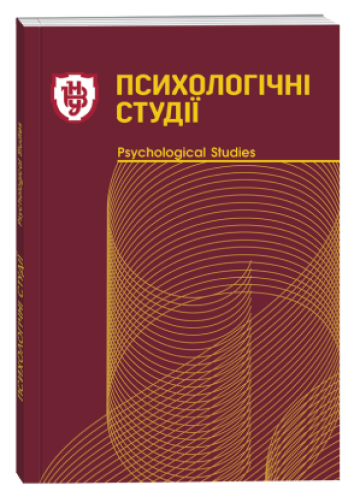ТИПОЛОГІЯ І ХАРАКТЕРИСТИКА ЖИТТЄВИХ СВІТІВ: ПСИХОЛОГІЧНІ КООРДИНАТИ, АДАПТАЦІЯ ТА ПОШУКИ СЕНСУ
DOI:
https://doi.org/10.32782/psych.studies/2023.2.4Ключові слова:
життєвий світ, особистість, психологічні координати, соціально-психологічна адаптація, пошук сенсу, типологія життєвих світів.Анотація
У статті розглядається важливість вивчення особистості у сучасних умовах з перспективи життєвого світу. Викладено короткий огляд походження поняття «життєвий світ» із феноменології Гуссерля, його розвиток та становлення як психологічної категорії. Коротко пояснено зміст цього поняття, зокрема, реляційно-конструктивістське розуміння Крауса. Згадано попередні спроби класифікації життєвих світів за певними ознаками, як-от залежно від змісту і структури потребнісно-мотиваційної сфери та від легкості або важкості задоволення значущих потреб, залежно від структури часу, відносин індивіда і суспільства та співвідношення сущого (наявного), належного і можливого як ціннісних критеріїв, залежно від особистісних дисгармоній у процесі розвитку особистості. Представлена авторська теоретична модель життєвого світу особистості та здійснена спроба на основі проведеного емпіричного дослідження створити типологію життєвих світів. Описано модель життєвого світу як постійну взаємодію системи зв’язків у мозку, психічних явищ та набору ментальних абстракцій, засвоєних у процесі культурної інтеграції індивіда. Визначено психологічні координати життєвого світу як своєрідні особливості внутрішніх переживань, що проявляються «назовні» у певній поведінці, думках і висловлюваннях, емоціях, інтерпретаціях навколишніх подій і явищ тощо. Обґрунтовано вибір цих психологічних координат як основи для спроби створення авторської типології життєвих світів. Підібрано відповідні методики для дослідження психологічних координат, проведено емпіричне дослідження та викладено деякі його результати. За допомогою проведеного кластерного аналізу визначено оптимальну кількість типів життєвих світів та запропоновано назву для кожного з них: гармонійний (збалансований), високоадаптивний гедоністичний, середньоадаптивний, спрямований на майбутнє, низькоадаптивний, спрямований на минуле і теперішнє, та дисгармонійний (дисфункціональний). Дано докладну характеристику кожному з типів, доповнену порівнянням з основними рисами особистості моделі Великої п’ятірки. Зроблено висновки про актуальність подібних досліджень особистості для розуміння буття людини у сучасному світі, особливо в умовах війни, коли потрібно бути особливо чутливими до внутрішніх переживань інших.
Посилання
Ганущак Р.І., Партико Т.Б. Життєвий світ як основа унікальності особистості. Науковий журнал з соціології та психології «Габітус». 2020. № 13. Т. 1. С. 110–116.
Гуссерль Е. Криза європейських наук і трансцендентальна феноменологія. Вступ до феноменологічної філософії. Філософська думка. 2002. № 3. С. 134–149.
Kraus B. Plädoyer für den relationalen Konstruktivismus und eine relationale soziale Arbeit. Forum Sozial. 2017. No. 1. P. 29–35.
Титаренко Т.М. Життєвий світ особистості: у межах і за межами буденності. Київ : Либідь, 2003. 376 с.
Carter R. The human brain book. London : DK, 2014. 264 p.
Nicolelis M. The true creator of everything: How the human brain shaped the universe as we know it. New Haven : Yale University Press, 2020. 376 p.
Schutz A. The Phenomenology of the social world. Evanston : Northwestern University Press, 1967. 255 p.
Merleau-Ponty M. Phenomenology of perception. London : Routledge and Kegan Paul, 1978. 466 p.
Binswanger L. Being-in-the-world: Selected papers of Ludwig Binswanger. New York City : Basic Books, 1975. 364 p.
May R., Angel E., Ellenberger H.F. Existence: A new dimension in psychiatry and psychology. New York City : Simon & Schuster, 1958. 445 p.
Minkowski E. Le temps vécu: Études phénoménologiques et psychopathologiques. Paris : Presses universitaires de France, 2013. 432 p.
Франкл В. Людина в пошуках справжнього сенсу. Психолог у концтаборі. Харків : Книжковий клуб «КСД», 2016. 160 с.
Dennet D. Intuition pumps and other tools for thinking. New York City : W.W. Norton & Company, 2013. 512 p.
Rogers C.R., Dymond R.F. Psychotherapy and personality change: Coordinated research studies in the client-centered approach. Chicago : University of Chicago Press, 1954. 457 p.
Сеник О.М. Адаптація опитувальника часової перспективи особистості Ф. Зімбардо (ZTPI). Соціальна психологія. 2012. № 1–2 (51–52). С. 153–168.
Кліманська М.Б., Галецька І.І. Українська адаптація короткого п’ятифакторного опи- тувальника особистості TIPI (TIPI–UKR). Psychological Journal. 2019. Vol. 5, Issue 9. P. 57–74.
Biley F.C., Galvin K. Lifeworld, the arts and mental health nursing. Journal of Psychiatric and Mental Health Nursing. 2007. No. 14. P. 800–807.
Todres L., Galvin K., Dahlberg K. Lifeworld-led healthcare: Revisiting a humanising philosophy that integrates emerging trends. Medicine, Health Care and Philosophy. 2007. No. 10. P. 53–63.
Dahlberg K., Todres L., Galvin K. Lifeworld-led healthcare is more than patient-led care: An existential view of well-being. Medicine, Health Care and Philosophy. 2009. No. 12. P. 265–271.







